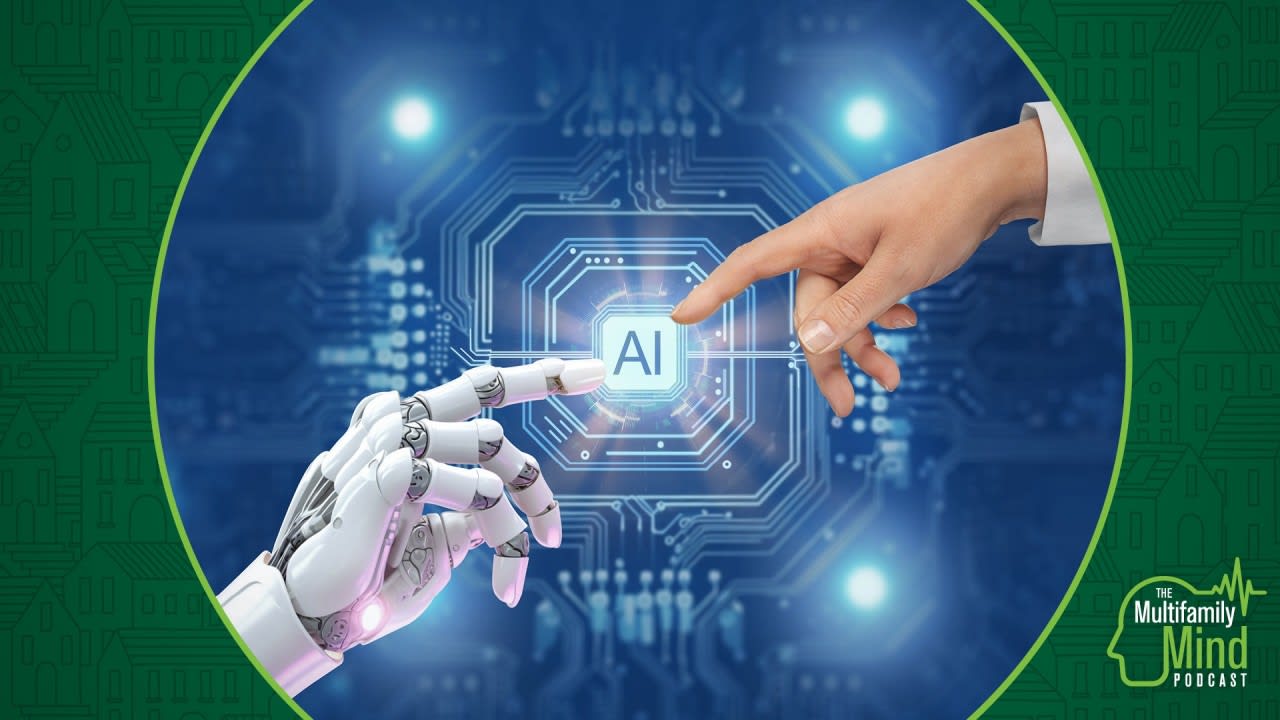The Intersection of Artificial Intelligence and Human Intelligence in Multifamily Property Management
In recent years, artificial intelligence (AI) has revolutionized many industries, and multifamily property management is no exception. AI has the potential to streamline operations, enhance customer experiences, and drive efficiencies for multifamily owners, operators, and leasing teams. Yet, the rise of AI has sparked a growing conversation about how it intersects with human intelligence and what it means for the future of work in the multifamily industry. While some fear that AI will replace j


In recent years, artificial intelligence (AI) has revolutionized many industries, and multifamily property management is no exception. AI has the potential to streamline operations, enhance customer experiences, and drive efficiencies for multifamily owners, operators, and leasing teams. Yet, the rise of AI has sparked a growing conversation about how it intersects with human intelligence and what it means for the future of work in the multifamily industry.
While some fear that AI will replace jobs, the reality is more nuanced. In multifamily property management, AI is not a replacement for human intelligence but a powerful tool that can augment and enhance the work of human professionals. This article explores the intersection of AI and human intelligence within the multifamily sector, highlighting the opportunities and challenges that come with integrating AI into everyday operations. It will also explore how property managers can strike the right balance between automation and the human touch, ensuring that AI complements, rather than replaces, the critical roles humans play in building relationships and communities.

The Rise of Artificial Intelligence in Multifamily Management
AI is increasingly being adopted across multifamily property management, reshaping how owners, operators, and leasing teams handle everything from marketing to maintenance. Key applications of AI in the industry include:
- Leasing Automation: Chatbots and virtual leasing assistants powered by AI can engage prospective residents, answering questions 24/7, scheduling tours, and guiding applicants through the leasing process. AI-driven tools like these can significantly reduce the workload of leasing agents while ensuring a prompt and consistent customer experience.
- Smart Maintenance: AI can help predict and address maintenance issues before they become emergencies. Predictive analytics can analyze historical data on appliances, HVAC systems, or other infrastructure to anticipate breakdowns, enabling property managers to perform preventive maintenance, saving time and money.
- Marketing and resident Engagement: AI tools can analyze data on prospective residents to optimize marketing campaigns, identify the best platforms for reaching the target demographic, and even craft personalized messages that resonate with potential residents. AI can also be used to enhance resident engagement by delivering customized communication and offers that are relevant to each individual’s needs and preferences.
- Rent Pricing: Many multifamily owners and operators are now utilizing AI-based dynamic pricing models. These systems analyze market trends, occupancy rates, and competitor pricing to recommend the optimal rent levels for maximizing occupancy and revenue. This is a stark contrast to the traditional static pricing models that often failed to capture real-time market conditions.
- Resident Screening: AI can also enhance resident screening by using algorithms to analyze an applicant’s credit, rental history, and even social behavior to assess their reliability as residents. This allows leasing teams to make more informed decisions and reduce the risk of future problems such as late payments or evictions.
The Power of Human Intelligence: Where AI Falls Short
While AI offers a multitude of benefits, it cannot replicate the human element that remains central to multifamily property management. The industry is built on relationships—between residents and leasing teams, property managers, and maintenance staff. Human intelligence, particularly emotional intelligence, plays a critical role in creating and nurturing these relationships.
- Emotional Connection and Trust: One of the core strengths of human intelligence is the ability to form meaningful emotional connections. AI can respond to queries and automate processes, but it cannot offer empathy, compassion, or personalized understanding in the way a human can. Leasing agents and property managers often deal with sensitive situations, such as negotiating lease renewals or resolving resident disputes, where the ability to listen, empathize, and build trust is invaluable.
- Problem Solving and Adaptability: While AI can follow predefined algorithms, it struggles with complex, ambiguous situations that require creative problem-solving. Human intelligence excels in handling unique scenarios that do not fit neatly into an algorithm. For instance, resolving a resident’s grievance about a noisy neighbor or addressing a last-minute maintenance issue requires the nuanced judgment and flexibility that AI cannot provide.
- Building Community: Multifamily living is not just about providing a place to live; it is about creating a sense of community. This is where human intelligence truly shines. Property managers and leasing teams play a vital role in fostering relationships between residents and organizing community events that bring people together. AI, for all its capabilities, cannot organize a community barbecue or sense the changing dynamics within a resident population that might call for specific programming or interventions.
- Understanding Context and Culture: Multifamily properties are often diverse environments with residents from different backgrounds, ages, and life stages. Human intelligence allows property managers and leasing agents to read subtle cultural and contextual cues that AI cannot process. Understanding cultural differences and knowing how to approach residents in a culturally sensitive manner is an area where humans will always have an edge over machines.
The Complementary Relationship Between AI and Human Intelligence
Rather than view AI as a threat to human jobs in multifamily management, it is essential to see AI as a tool that can complement and enhance human intelligence. When used effectively, AI can free up time for property managers and leasing teams to focus on what they do best—building relationships, solving complex problems, and creating thriving communities. By automating repetitive tasks, AI allows human professionals to dedicate more of their time and energy to high-value, human-centric work.
Case Study: AI-Powered Leasing and the Human Touch
Consider the leasing process, where AI has already made significant inroads. AI-powered virtual leasing assistants can handle a large volume of inquiries, schedule property tours, and even provide follow-ups. This reduces the administrative burden on leasing agents, allowing them to focus on providing personalized service during property tours, negotiating leases, and building rapport with prospective residents.
A leasing team that uses AI strategically can combine the efficiency of automation with the warmth and personal attention of human interaction. For example, while AI might handle initial inquiries, leasing agents can step in to close the deal by addressing specific concerns, offering tailored solutions, and making prospective residents feel valued. This approach leverages the best of both worlds: AI handles the routine tasks, while humans deliver the relationship-building experiences that lead to higher satisfaction and retention rates.
Statistics on AI in Multifamily Property Management
The adoption of AI in the multifamily sector is growing rapidly, driven by the need for operational efficiencies and improved customer experiences. Several statistics highlight the growing importance of AI in property management:
- Operational Efficiency: A study by the National Multifamily Housing Council (NMHC) found that 57% of multifamily property managers believe that AI will improve operational efficiency by automating routine tasks and streamlining workflows.
- Resident Experience: According to a survey by Entrata, 74% of multifamily professionals agree that AI-powered technologies, such as chatbots, have enhanced resident experiences by providing faster responses and more consistent communication.
- Revenue Optimization: A report by the real estate technology platform RealPage found that multifamily operators using AI-based dynamic pricing systems saw a 5-10% increase in revenue, driven by more accurate rent recommendations that adapt to market conditions in real time.
- Resident Screening: Research from TransUnion suggests that AI-driven resident screening tools reduce the risk of resident defaults by 15%, thanks to more comprehensive and data-driven assessments of applicants.
- Maintenance: Predictive maintenance solutions powered by AI have been shown to reduce maintenance costs by up to 20%, according to a study by Deloitte, due to the ability to anticipate and prevent breakdowns before they occur.
These statistics underscore the tangible benefits that AI can bring to the multifamily industry, particularly in areas like efficiency, revenue optimization, and risk management.
Challenges and Ethical Considerations
While the benefits of AI in multifamily management are clear, there are also challenges and ethical considerations that must be addressed. As AI becomes more integrated into property management, questions arise about data privacy, algorithmic bias, and the potential for job displacement.
- Data Privacy: AI systems often rely on large amounts of personal data to function effectively. Whether it is analyzing rental history or predicting maintenance needs, AI systems collect and process sensitive information. Property managers must ensure that they are complying with data privacy regulations and protecting resident data from breaches or misuse.
- Algorithmic Bias: AI algorithms are only as good as the data they are trained on. If the data contains biases—whether related to race, gender, income, or other factors—those biases can be reflected in the AI’s decisions. This is particularly concerning in areas like resident screening, where biased algorithms could unfairly disadvantage certain applicants.
- Job Displacement: While AI has the potential to enhance human jobs, there is also the risk that some roles may become redundant as automation takes over more tasks. Property management companies must carefully consider how to retrain and redeploy employees to ensure that AI complements human labor rather than replaces it.
A Call to Action for Multifamily Professionals
As AI becomes more integrated into the multifamily industry, professionals must adapt to this new landscape. The challenge is not whether AI will replace jobs but how property management teams can harness AI to improve their performance and the resident experience.
To truly unlock the potential of AI in multifamily, property owners, operators, and leasing teams should:
- Invest in AI Training: Ensure that your teams are well-versed in the AI tools available and understand how to use them effectively in their daily tasks.
- Focus on Emotional Intelligence: While AI handles data-driven tasks, prioritize building emotional intelligence within your teams to foster trust and community with tenants.
- Continuously Evaluate AI Tools: The landscape of AI technology is evolving rapidly. Regularly assess the effectiveness of your AI tools and stay open to adopting new solutions that align with your business goals.
The future of multifamily property management is one where AI and human intelligence work hand in hand. Property management professionals who embrace this future will be better positioned to win in what is becoming an increasingly competitive and renter-centric market.
Subscribe to our newsletter
Proven sales tips, and exclusive SalesMail news. Discover how to boost your connections and measurable results.





